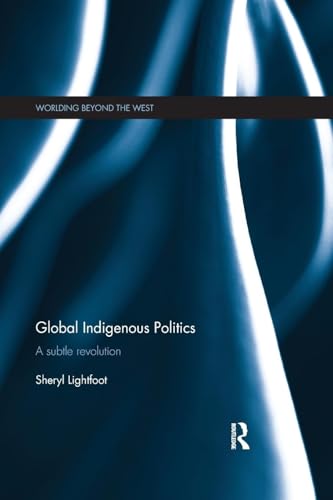Global Indigenous Politics: A Subtle Revolution (Worlding Beyond the West)
Global Indigenous Politics: A Subtle Revolution (Worlding Beyond the West) is backordered and will ship as soon as it is back in stock.
Couldn't load pickup availability
Genuine Products Guarantee
Genuine Products Guarantee
We guarantee 100% genuine products, and if proven otherwise, we will compensate you with 10 times the product's cost.
Delivery and Shipping
Delivery and Shipping
Products are generally ready for dispatch within 1 day and typically reach you in 3 to 5 days.
Author: Sheryl Lightfoot
Brand: Taylor & Francis Ltd
Edition: 1
Binding: Paperback
Number Of Pages: 264
Release Date: 12-01-2018
EAN: 9781138477858
Package Dimensions: 9.2 x 6.2 x 0.7 inches
Languages: English
Details:
This book examines how Indigenous peoples' rights and Indigenous rights movements represent an important and often overlooked shift in international politics—a shift that powerful states are actively resisting in a multitude of ways. While Indigenous peoples are often dismissed as marginal non-state actors, the book argues that global Indigenous politics is potentially forging major changes in the international system. The implementation of Indigenous peoples' rights requires a complete re-thinking and re-ordering of sovereignty, territoriality, liberalism, and human rights.
After thirty years of intense effort, the transnational Indigenous rights movement achieved the passage of the UN Declaration on the Rights of Indigenous Peoples in September 2007. This book asks key questions:
-
Why did the movement need to fight so hard to secure passage of a minimum standard on Indigenous rights?
-
Why are certain states so threatened by an emerging international Indigenous rights regime?
-
How does the emerging Indigenous rights regime change the international status quo?
The answers are explored by examining how Indigenous politics at the global level compels a new direction of thought in international relations by challenging fundamental tenets of the discipline. With the recognition of Indigenous peoples’ collective rights to land and self-determination, global Indigenous politics complicates international politics in new and important ways, challenging Westphalian notions of state sovereignty and the (neo-)liberal foundations of states and the international human rights consensus.
Qualitative case studies of Canadian and New Zealand Indigenous rights, based on original field research, analyze both the potential and the limits of these challenges. This work will be of interest to graduates and scholars in international relations, Indigenous studies, and related fields.





